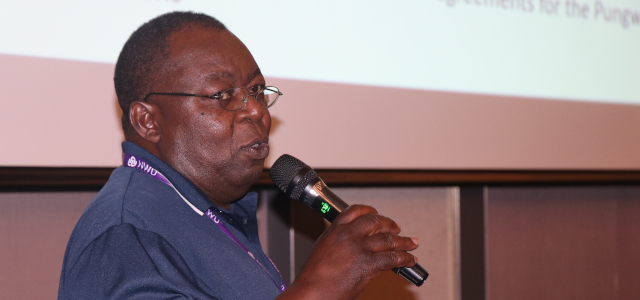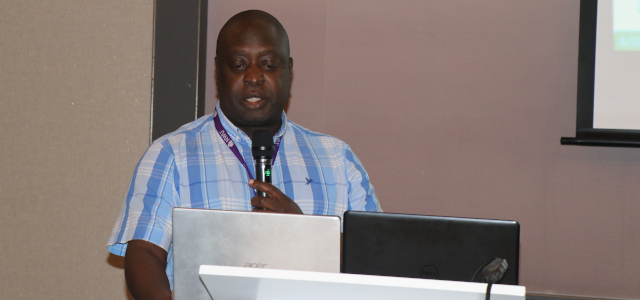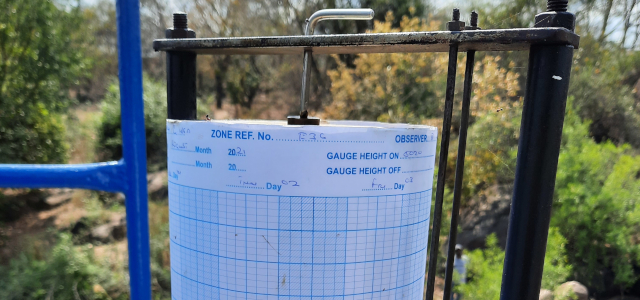This was one of the key recommendations from data experts during the session “Data and Decision-Making in Transboundary Waters”, held on 20 October 2022. The session was convened by the Global Water Partnership Southern Africa (GWPSA), the International Union for Conservation of Nature (IUCN)and Oregon State University at the 23rd WaterNet/WARFSA/GWPSA Symposium.
“Capacity and funding are some of the key challenges in developing information and data to support decision making and negotiation. There is a great need to build capacities of institutions to collect, archive and disseminate data for decision making”, said Prof. Dominic Mazvimavi, from University of the Western Cape in his keynote address. “To attract funding for its use in decision making, data has to be packaged attractively into information products that attract confidence and validate the need for continued collection of data and information.

Prof. Dominic Mazvimavi, underpins the importance of developing capacity for data collection, archiving, and dissemination in institutions
He emphasised that the adequacy of data and information in decision-making in transboundary water management depends on whether the knowledge derived from the data is adequate to bring a solution to a problem for a desired outcome, citing the importance of taking requisite measures to ensure that right information is extracted from the data collected.
Drawing on their experiences from successful and ongoing negotiations in the Pungwe, Buzi, and Save river basins, the BuPuSa Project Management Unit (PMU) discussed the data challenges and gaps faced during the negotiation processes and how they overcome them.
Mr. Elisha Madamombe, Regional Coordinator for the GEF-funded “Management of competing water uses and associated ecosystems in the Pungwe, Buzi and Save basins”, project implemented by the International Union for Conservation of Nature (IUCN) and executed by Global Water Partnership Southern Africa (GWP-SA) together with the Government of Mozambique (GoM) and Government of Zimbabwe (GoZ) said, “In the process of negotiating water-sharing agreements for the Buzi and Pungwe basins, gaps in the quality and quantity of data were identified. Provision in the Agreements were made to allow for and accommodate new data to fill in some of these gaps”.

Mr. Elisha Madamombe shares the challenges and lessons learnt during the negotiations for the BuPuSa agreements
He emphasised the importance of data sharing in the managing of water resources, noting that Mozambique and Zimbabwe had prioritised this as evidenced by the development of the BUPUSA Data Sharing Protocol.
The Data Sharing Protocol for the Buzi Pungwe and Save River (BuPuSa) basins is a set of rules and procedures between the Republic of Zimbabwe and the Republic of Mozambique on the sharing of data and information related to the Buzi, Pungwe and Save watercourses. The protocol was developed to ensure the timely collection, collation, dissemination and exchange of data and information on water resources that will enable informed decision-making in relation to the planning, development management and sustainable utilisation of the shared water resources in the three basins.
The GWP Toolbox is a mong the global databases which provide information about river basins. The toolbox is a global knowledge platform which supports actors to implement integrated water resources management (IWRM), share knowledge and expertise about their implementation experiences, and bring relevant stakeholders together to improve the way water is managed around the world.
“Gaps in data for decision-making can be overcome by looking at global trends using global databases, which provide support to policymakers through a wide range of freely available water resources, policy, and governance data,” said Dr Melissa McCracken from the Fletcher School at Tufts University. “Global datasets fill potential data gaps and create a foundation for building joint data collection or sharing programs.”
Global datasets support relationship building and establishing a common and shared understanding of the water resources, provide outside examples of policy, legal mechanisms, and institutional design and encourage creative discussion of alternative mechanisms through global scale of examples.
Examples of global datasets include the GWP- IWRM Toolbox; International Waters Learning Exchange & Resource Network; Transboundary Waters Assessment Programme – River Basins Assessment; Water Law, Governance & Diplomacy Platform; International Groundwater Resources Assessment Centre; Water, Peace, and Security Partnership; World Resources Institute’s Aqueduct; and Food and Agriculture Organization’s AQUASTAT. Other useful data sets include the UN-Water’s SDG 6 Data Portal; Transboundary Freshwater Diplomacy Database; and World Bank Water Data.
The BuPuSa session explored how data supports or interferes with decision-making for transboundary water management and negotiations, determining how much data is needed, overcoming challenges with data availability, accessibility and establishing mutual trust in the quality of data.
Other challenges encountered in using data for decision-making are incompleteness of data, inadequate quality control in the collection of data and data collected for specific institutional uses, making it difficult to use for transboundary water management. Experts also noted lack of access to existing data as a major drawback emanating from the lack of institutional frameworks for granting access and dissemination of data and the lack of tools for efficiently utilizing data. Some institutions hold on to their data due to the costs they incurred in collecting it and making it usable.
Partners agreed that trust in data-sharing, decision-making, and negotiation processes is key to building confidence in both the data and negotiators. The session also emphasized the need to know beforehand the kind of data one requires, its quantity and quality, and what constitutes adequacy and sufficiency of the required data.
Among some of the lessons cited as having been learnt from negotiation experiences shared during the session are; consensus on the rules for negotiations, the need for negotiation workplans with clear deliverables, the need for confidence building through training, building consensus, and engaging stakeholders right from the start of the negotiations. The importance of transparency and provision for revisiting agreements to make necessary adjustments to accommodate changes and new evidence was also emphasized, especially in the cases of data-sharing agreements.
The 23rd WaterNet/WARFSA/GWPSA Symposium was held at Sun City Conference Centre, in South Africa and online on 19 – 21 October 2022, under the theme, “Integrated Water Resources Management for Sustainable Development in East and Southern Africa”
